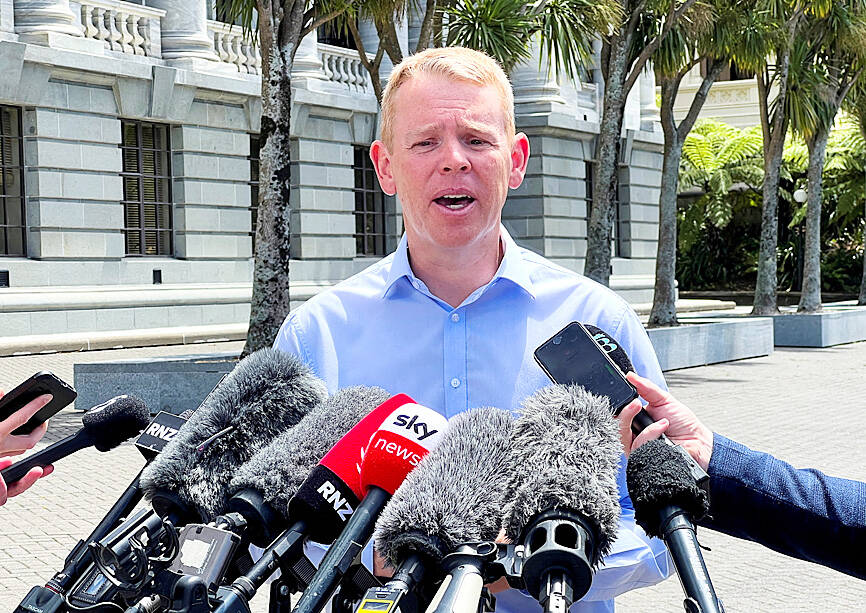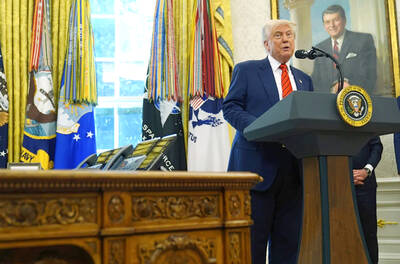New Zealand’s government is dumping a range of high-profile reforms and emissions reduction measures as part of its promise to refocus on “bread and butter issues,” using the savings to introduce a billion-dollar boost to welfare payments to relieve cost of living pressures.
New Zealand Prime Minister Chris Hipkins yesterday said that the government is to roll out increases for retirees, students, unemployed people and parents, ranging from NZ$19.81 to NZ$46.20 (US$12.24 to US$28.54) per week.
The government estimated that 1.4 million New Zealanders would benefit.

Photo: Reuters
The government is to fund the increased welfare payments by scrapping, shrinking or delaying a number of legislative reforms, including lowering the voting age to 16, reducing driving speed limits, restricting the sale and marketing of alcohol, clean vehicle grants, light rail projects and road transportation reforms designed to reduce carbon emissions.
New Zealanders were focused on cost of living pressures and recovering from Cyclone Gabrielle, and government priorities must reflect that, Hipkins said.
“Stopping some of our plans and putting others on a slower track gives us the bandwidth to focus on those immediate priorities, while also saving some money so that we can provide a little bit of extra support to help families with increasing costs,” he said.
“Some of these things we’re delaying or stopping mean a lot to us as a government, but we’re taking the hard decisions because we know Kiwis are also making some tough calls,” he said.
Many of the reforms scrapped by Hipkins had been focused on reducing carbon emissions. One of the largest financial reallocations would be NZ$568 million from halting the clean vehicle upgrade scheme, wherein households could scrap old vehicles in return for a grant for a cleaner, lower emissions vehicle, or to pay for public transportation.
Also delayed is a project to build a light rail system for Auckland, the country’s largest city, which would now be rolled out in stages. Earlier in the year, Hipkins scrapped rules that required fuel companies to add biofuels to gasoline, and announced extended tax cuts for gasoline in light of high fuel prices.
Regarding whether the government’s reprioritizing meant it was abandoning its climate crisis ambitions, Hipkins said the government was still committed to reducing carbon emissions.
“The climate policies that we’re talking about today would have made a very small contribution to our overall emissions reductions targets,” he said. “We’re not changing our emissions reductions budgets — we are making some changes to how we will go about achieving those budgets.”
Also on the chopping block is lowering New Zealand’s voting age.
Former New Zealand prime minister Jacinda Ardern last year committed to introducing legislation to lower the voting age to 16, after the Supreme Court ruled that the current law was discriminatory.
Hipkins said that while he personally supported lowering the voting age, that legislation would no longer be brought forward — although the government would bring in legislation to reduce the voting age in local body elections.

A new online voting system aimed at boosting turnout among the Philippines’ millions of overseas workers ahead of Monday’s mid-term elections has been marked by confusion and fears of disenfranchisement. Thousands of overseas Filipino workers have already cast their ballots in the race dominated by a bitter feud between President Ferdinand Marcos Jr and his impeached vice president, Sara Duterte. While official turnout figures are not yet publicly available, data from the Philippine Commission on Elections (COMELEC) showed that at least 134,000 of the 1.22 million registered overseas voters have signed up for the new online system, which opened on April 13. However,

ALLIES: Calling Putin his ‘old friend,’ Xi said Beijing stood alongside Russia ‘in the face of the international counter-current of unilateralism and hegemonic bullying’ Chinese President Xi Jinping (習近平) yesterday was in Moscow for a state visit ahead of the Kremlin’s grand Victory Day celebrations, as Ukraine accused Russia’s army of launching air strikes just hours into a supposed truce. More than 20 foreign leaders were in Russia to attend a vast military parade today marking 80 years since the defeat of Nazi Germany in World War II, taking place three years into Russia’s offensive in Ukraine. Putin ordered troops into Ukraine in February 2022 and has marshaled the memory of Soviet victory against Nazi Germany to justify his campaign and rally society behind the offensive,

CONFLICTING REPORTS: Beijing said it was ‘not familiar with the matter’ when asked if Chinese jets were used in the conflict, after Pakistan’s foreign minister said they were The Pakistan Army yesterday said it shot down 25 Indian drones, a day after the worst violence between the nuclear-armed rivals in two decades. Pakistani Prime Minister Shehbaz Sharif vowed to retaliate after India launched deadly missile strikes on Wednesday morning, escalating days of gunfire along their border. At least 45 deaths were reported from both sides following Wednesday’s violence, including children. Pakistan’s military said in a statement yesterday that it had “so far shot down 25 Israeli-made Harop drones” at multiple location across the country. “Last night, India showed another act of aggression by sending drones to multiple locations,” Pakistan military spokesman Ahmed

US President Donald Trump on Wednesday said that he would make a decision about how the US government would refer to the body of water commonly known as the Persian Gulf when he visits Arab states next week. Trump told reporters at the White House that he expects his hosts in Saudi Arabia, Qatar and the United Arab Emirates will ask him about the US officially calling the waterway the Arabian Gulf or Gulf of Arabia. “They’re going to ask me about that when I get there, and I’ll have to make a decision,” Trump said. “I don’t want to hurt anybody’s